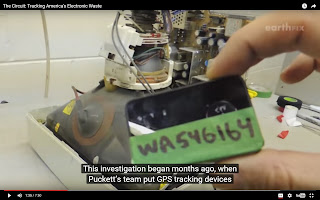In March 2015, a group of Ghana customs agents, Ghana Tech Sector importers, and three USA journalists accompanied WR3A from the scorched waterside where copper and aluminum wires - wires from cars, appliances, and computers - were being torched in tires. We'd walked about the fires, dodging the black smoke, as WR3A's Dagbani translator (and Tech Sector Geek, first introduced on this blog (May 2011) translated for a group of young men led by Muhammed Awal.
(Note: I've kind of deliberately avoided really nice photos here, just to kind of capture the ordinariness of it all)
 The photographers (myself included) had all snapped some great and alarming shots of young men, dirt, poverty, pollution, and smoke. The ENGO's halloween language would be hard to resist. But we now moved the the larger Agbogbloshie yard, where by hammer and screwdriver and axe, metals were being separated from each other and from the plastic skins and wire nerves that bound their bodies.
The photographers (myself included) had all snapped some great and alarming shots of young men, dirt, poverty, pollution, and smoke. The ENGO's halloween language would be hard to resist. But we now moved the the larger Agbogbloshie yard, where by hammer and screwdriver and axe, metals were being separated from each other and from the plastic skins and wire nerves that bound their bodies.
The first electronic or "e-Waste" device we photographed was a VHS or VCR player. It was, no doubt, originally imported used. The Italian photographers got their lenses up close, accepting the premise that this represented and "obsolete" import.
 Joe Benson's container exports were itemized, not just by count of appliance, but by brand and model. In 100 pages of documents I reviewed, there was no VCR. Wahab, the Ghana Tech who made our tour possible, would never have imported one.
Joe Benson's container exports were itemized, not just by count of appliance, but by brand and model. In 100 pages of documents I reviewed, there was no VCR. Wahab, the Ghana Tech who made our tour possible, would never have imported one.
But back in the day, when I lived in West Africa in the 1980s, VCRs were a hot commodity. An entire industry of "duplicate" movies existed in Nigeria. Knock off copies of "Rocky" and "Rambo" and "Bob Marley Concerts" were in every marketplace, from Yaounde to Ngaoundal. Cameroon was still in the business of erecting TV towers, but the "critical mass of users" who made those investments promising had obtained used CRT televisions - every one of which demanded a VHS player as much as it did electricity.
When I looked down and saw the young men pounding, I saw a flashback of scrap appliance from Africa's past decades. I wondered, did the young Italian documentary makers (in their 20s) have any idea what a VHS player was, and could they imagine a Joe Benson or Wahab buying one from an "e-waste" collector and paying thousands of dollars to ship it here?
(Note: I've kind of deliberately avoided really nice photos here, just to kind of capture the ordinariness of it all)
The first electronic or "e-Waste" device we photographed was a VHS or VCR player. It was, no doubt, originally imported used. The Italian photographers got their lenses up close, accepting the premise that this represented and "obsolete" import.
But back in the day, when I lived in West Africa in the 1980s, VCRs were a hot commodity. An entire industry of "duplicate" movies existed in Nigeria. Knock off copies of "Rocky" and "Rambo" and "Bob Marley Concerts" were in every marketplace, from Yaounde to Ngaoundal. Cameroon was still in the business of erecting TV towers, but the "critical mass of users" who made those investments promising had obtained used CRT televisions - every one of which demanded a VHS player as much as it did electricity.
When I looked down and saw the young men pounding, I saw a flashback of scrap appliance from Africa's past decades. I wondered, did the young Italian documentary makers (in their 20s) have any idea what a VHS player was, and could they imagine a Joe Benson or Wahab buying one from an "e-waste" collector and paying thousands of dollars to ship it here?

